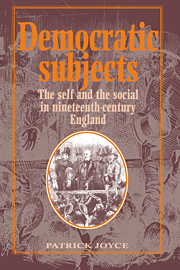Book contents
- Frontmatter
- Contents
- List of plates
- Acknowledgements
- Introduction
- Part One The sorrows of Edwin Waugh: a study in ‘working-class’ identity
- 1 Young Edwin
- 2 The struggle for the moral life
- 3 The ends of the moral life
- 4 The cult of the heart
- 5 ‘God bless these poor folks’
- 6 The legacy of Edwin Waugh
- Part Two John Bright and the English people: a study in ‘middle-class’ identity
- Part Three Democratic romances: narrative as collective identity in nineteenth-century England
- Appendices
- Index
5 - ‘God bless these poor folks’
Published online by Cambridge University Press: 10 December 2009
- Frontmatter
- Contents
- List of plates
- Acknowledgements
- Introduction
- Part One The sorrows of Edwin Waugh: a study in ‘working-class’ identity
- 1 Young Edwin
- 2 The struggle for the moral life
- 3 The ends of the moral life
- 4 The cult of the heart
- 5 ‘God bless these poor folks’
- 6 The legacy of Edwin Waugh
- Part Two John Bright and the English people: a study in ‘middle-class’ identity
- Part Three Democratic romances: narrative as collective identity in nineteenth-century England
- Appendices
- Index
Summary
To explore the hold of Waugh on the popular imagination needs consideration of his influence on other writers, particularly those who wrote directly for a popular audience. Waugh wrote in this way, though, true to his religion of humanity, he wrote for all people (he was certainly taken up by an upper class-audience, for whom expensive, annotated versions of his works were published). In particular, Waugh had a profound influence on John Hartley and Joe Wilson, the two most influential writers in the two regions outside Lancashire which were the other great centres of dialect writing, industrial Yorkshire and the industrial north-east. Hartley said he had no thought of writing literature until he picked up a book of Waugh's verse. Wilson also declared his vast debt to Waugh, as did many of Waugh's contemporary authors in Lancashire, of his own and subsequent generations. In the next section John Hartley, editor of the big-selling Halifax Illuminated Clock Almanack, will be considered: Hartley and his almanac (one of a large number of decidedly popular publications in the West Riding), exemplified many of the concerns of Waugh, and it is through it that one is aware how the cult of the heart, and ideas about independence, the brotherhood of man, and the nobility of the poor, were reworked for subsequent generations of the labouring poor as well as for their laureates.
- Type
- Chapter
- Information
- Democratic SubjectsThe Self and the Social in Nineteenth-Century England, pp. 63 - 71Publisher: Cambridge University PressPrint publication year: 1994



